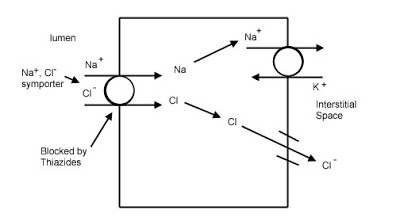 In recent years, there has been the suggestion that thiazide diuretics–long considered a front-line therapy for hypertension based on the ALLHAT study and others–may increase the risk of diabetes. Subsequent retrospective analysis of other major historical cohorts by Eric Taylor and others–such as the Nurse’s Health Study and Health Professionals Follow-Up Study–seem to indicate that the relative risk of being diagnosed with incident diabetes is somewhere between 1.2 to 1.46 in individuals taking thiazides compared to those not taking thiazides with similar baseline characteristics. What do we think about this data and should it change our clinical practice of prescribing thiazide monotherapy to an individual recently diagnosed with hypertension? Also, why should thiazides result in hyperglycemia?
In recent years, there has been the suggestion that thiazide diuretics–long considered a front-line therapy for hypertension based on the ALLHAT study and others–may increase the risk of diabetes. Subsequent retrospective analysis of other major historical cohorts by Eric Taylor and others–such as the Nurse’s Health Study and Health Professionals Follow-Up Study–seem to indicate that the relative risk of being diagnosed with incident diabetes is somewhere between 1.2 to 1.46 in individuals taking thiazides compared to those not taking thiazides with similar baseline characteristics. What do we think about this data and should it change our clinical practice of prescribing thiazide monotherapy to an individual recently diagnosed with hypertension? Also, why should thiazides result in hyperglycemia?
Interestingly, there is data to suggest that the thiazide-induced hyperglycemia effect is a potassium effect: a 2006 review of >50 trials in which thiazides were compared to other blood pressure-lowering medications or placebo, it was found that for every 1 mEq/L decrease in K, there is a 10 mg/dL increase in glucose. Furthermore, normalization of serum potassium in patients on thiazides (with potassium supplements) will lower the serum glucose.
From a molecular level, this is perhaps explained by the fact that the pancreatic b-cell secretion of insulin is regulated in large part by ATP-sensitive K channels in the beta-cell membrane. Alterations in the extracellular potassium concentration to which these cells are exposed could potentially lead to decreased insulin secretion.
If this mechanism is correct, it would imply that thiazide-induced hyperglycemia occurs by a different mechanism (decreased insulin secretion) than the standard type 2 diabetes (peripheral insulin resistance), and furthermore that thiazide-induced hyperglycemia is reversible with normalization of potassium levels. Thus, it is probably not necessary to remove thiazides from the list of useful first-line agents for treatment of hypertension. That being said, as a budding nephrologist I am always looking for a good reason to prescribe an ACE-inhibitor or ARB, and therefore I personally tend to add one of the RAAS blockers first given the population of clinic patients that I see.



Beautifully explained. Thanks
Nice..thk u
Nice..
My mom is also taking hydrchlorthiazide..and she is a diabetic under insulin..
Interesting point. Read the article too.